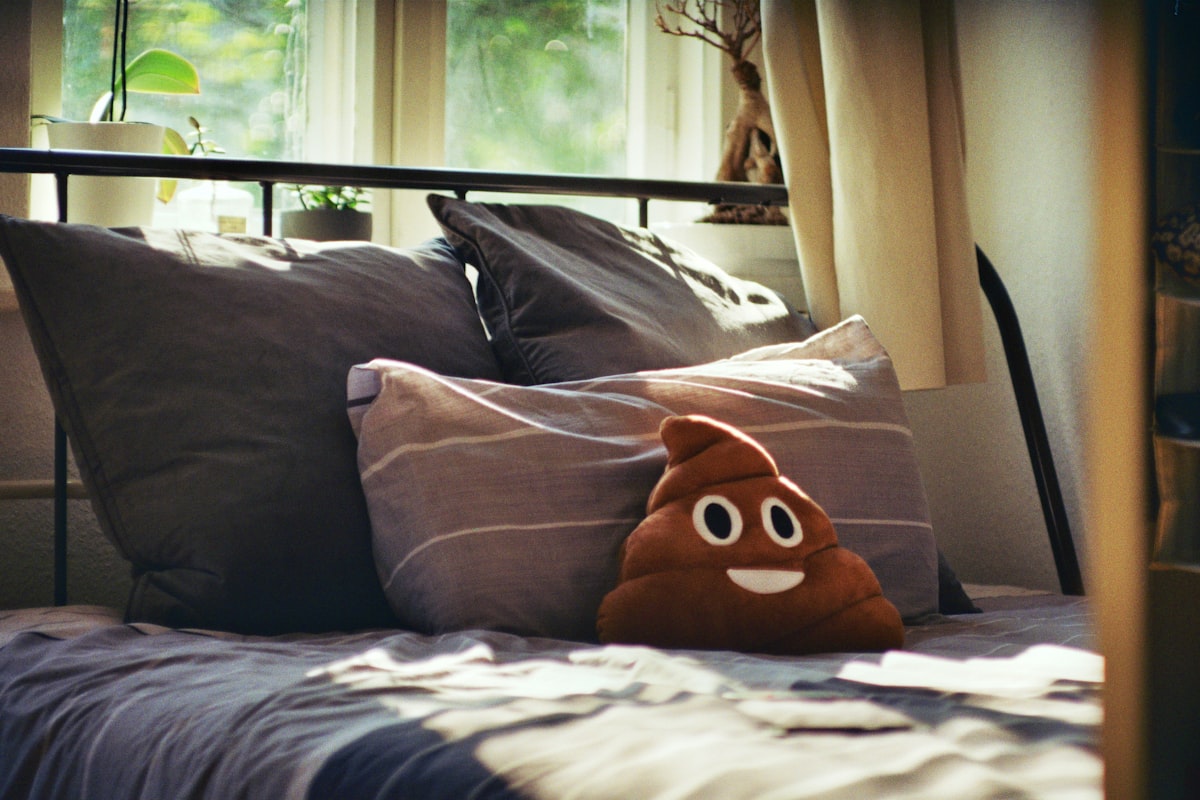The Bitter-Pill Truth About Making Your Bed
Bed Making (feat. Jaw-Dropping Results)

Steel yourselves. I don't know how one steels themselves – perhaps it is by taking an enormous amount of iron, grabbing a few charcoal bricks, and climbing into a blast furnace – but do what you need to prepare. This one is a big deal.
Throughout this newsletter, I have championed brevity, mainly in the works of others. This is ironic, because my own posts are often thousands of words long. And yet, I long still for the succinct. I crave it. I want a life-changing piece of advice to be one sentence. A life sentence, if you will.
Shower thought: a life sentence could be as short as one day. Hmm. Isn't that profound? Such profundity, in your inbox, for free. I'd subscribe to me.
But I, as always, digress.
Here's the point: I followed one of those pieces of self-help advice that everyone advises and no-one (except me) follows.
I made my bed, every single day, for one whole year.
Really.
And here are the staggering, jaw-dropping, doctors-hate-him results.
I hope you're ready for this.
Every single day that I made my bed, my bed was made.
Let that sink in. I, single-handedly, or double-handedly if I'm being honest, overcame the forces of Chaos and Entropy and forced my own Order on an uncaring universe. I am the carpenter God of my own tiny world. I am the Maker of Beds.
I bet you want to know how I did it.
Method
Here is the Drummond Protocol for Bed-Making, as articulated on my four-hour daily science podcast, the B-Lab (podcast forthcoming, title TBC, sponsored by Mathletic Greens, the only supplement proven* to support your mathematical skill).
Step 1: Be alive.
Step 2: (Optional) Sleep in bed. You don't actually need to sleep in a bed yourself. You can make someone else's bed if you like. I suggest visiting a friend, or breaking in to a neighbour's house. Surprise!
Step 3: Make the bed.
If you want to know more specifically how to make a bed, visualisation might be helpful. Perhaps you could do it as part of your daily meditation. Simply picture a bed, a made bed, as you might have seen in movies or catalogues advertising desirable goods and services. Then stop meditating and make the bed.
You can also manifest a made bed. Start by feeling that the Universe loves you and wants the best for you. (It doesn't.) Imagine your made bed. Envisage it in rich detail. The satisfyingly smooth covers, the perfectly fluffed pillows. A duvet shook free of dust mites and cat hair. Let the image play in your mind, and then feel the universe make it real. Ideally, as a time-saving measure, you can do all this manifesting at the exact same time you actually make your bed. Isn't the Universe amazing?
Results of daily bed-making (amazing)
What else happened? What superpowers resulted? What other beneficial habits did I take up as a direct result of my sheet-tugging and duvet-smoothening? How did my finances improve? Did my deadlift go up? What about the positive effects on my marriage and general well-being?
Steel yourself. No, wait, you already did that. Tungsten yourself. Prepare for jaw-dropping. I suggest either a cushion on the floor or a tiny crash helmet you wear on your chin.
What happened was:
Nothing.
In short: I made my bed every day and nothing happened.
That's the article, but you can keep reading if you want.
I hope you enjoyed that. I did. Blowing the sentence "I made my bed for a year and nothing happened" out to 500-ish bloviated words is an enjoyable creative writing exercise; a must-do for any budding self-help author. I suppose it's unfair to say that nothing happened. I liked having a made bed every day, or rather, every night, when I climbed into it. It's nice for things to be tidy. And there was the usual mild satisfaction of doing something I hadn't previously done on any kind of regular basis. But there was no epiphany, no greater purpose, no flow-on effect that I could notice. (Unlike taking cold showers, of which I'm still a daily fan.) And, believe me, with the bed-making I was trying to notice an effect. I didn't want to be doing something every day for a year for no reason. It was very motivated reasoning! To make sure it was a fairish test, albeit a test with a sample size of one, I made a point of not making the bed for several weeks after my year was up and didn't notice the slightest difference. I wish I could say that this was the Atomic Habit that I built an entire network of other beneficial habits on but it just... wasn't. It was fine, I suppose, but it also didn't matter.
It might be different for you. Maybe making your bed will set you up for life. Maybe it'll drag you out of a funk. Maybe it will depress you. Maybe you'll find a long-lost five dollar note in the sheets. I have no idea. You may as well try it; I definitely don't think it'll hurt. As far as risk calculus goes I think making your bed is up there with "going outside" and "drinking water;" it's not advice that needs to be studded with caveats.
But there is another story here: a case-study in how the news media launders and makes up the kind of bullshit that's designed to sell self-help books.
And, as it turns out, beds.
Make (Up) Your Bed (Bullshit)
There is no shortage of self-help stuff that tells you to make your bed. Many people's minds probably turn to Jordan Peterson, whose book 12 Rules for Life I am, out of a sense of obligation to readers, reading. Aside: this book is hilarious. Here is a real excerpt.
Chaos, by contrast, is where – or when – something unexpected happens. Chaos emerges, in trival form, when you tell a joke at a party with people you think you know and a silent and embarrassing chill falls over the gathering.
I swear I didn't make that up. The whole book is written that way and it's one of the funniest things I've ever read. Wodehouse and Bryson have nothing on Peterson. Humour aside, Peterson is associated with bed-making, thanks to the chapter in 12 Rules for Life entitled "Set your house in perfect order before you criticise the world."
We'll make space for Peterson and this... interesting sentiment in another newsletter, but for now it'll suffice that he's sort of associated with making beds, or at least getting your room tidied up. Here's a video of him expounding on bed-making, set to an inspiring free-music soundtrack, that I promise will not enlighten you at all:
If you want to save yourself five minutes, the auto-generated transcript gives you all the flavour you're going to need, as his entire talk on bed-making is essentially one enormous run-on sentence.
...and so you want to clean up your room well okay how do you do that exactly well a room is a room is a place to sleep and so if you set your room up properly then you figure out how to sleep and when you should sleep and how you should sleep and then you figure out when you should wake up and then you figure out, well, what clothes you should wear because they have to be arranged properly in your dresser and then you have to have some place to put your clothes if you're going to have some clothes...
So let's leave Peterson for a bit. He doesn't really dwell on bed-making all that much; for him it is just part of the setting-your-house-in-perfect-order continuum. The main Make Your Bed guy is one Admiral William H. McRaven.

McRaven's book on bed-making is called, as you might expect, "Make Your Bed." It spawned a daily journal, also entitled "Make Your Bed," and God knows how many knockoffs on Amazon and Kindle Unlimited, which are also mostly called "Make Your Bed." I accidentally downloaded one called Make Your Bed: The Keys to Achieving Anything You Dream by John Dmitry Bordelon: do not make the same mistake. The McRaven original is exactly the the kind of self-help I always look for: distillable down from tens of thousands of words to a single sentence, which – blessedly – negates the need to buy the book. At least it's shorter than most self-help, which is because it's based on an even shorter commencement speech McRaven gave at the University of Texas that went viral. The rave music video based on the inspirational speech is shorter still.
Lots of people did buy the book, though. Make Your Bed is, astonishingly, a number 1 New York Times bestseller. I'll never not be amazed that the most simplistic, obvious self-help stuff is what sells best.
I bought it too, of course, because it's kind of my job.
And it's fine, I guess? McRaven seems to be one of the less objectionable officers in the spectrum of those who serve the American Imperium, and his book does exactly what it says on the tin. Sure, it's problematic in the way much self-help is – it glorifies martial ways of living, as taught by men who make a virtue of acquiring PTSD by blowing up anyone who hampers US access to oil fields – but ultimately it's really just a lengthy, mostly harmless paraphrase of a Bible verse, Luke 16:10: "If you are faithful in little things, you will be faithful in large ones. But if you are dishonest in little things, you won’t be honest with greater responsibilities." There is nothing particularly wrong with it, apart from the writing. Look, it's self-help; if you're after prose styling you'll read Proust or something. But there is no excuse for this, apart from comedy:
For the first few months, we slept on Army cots. Nevertheless, I would wake every morning, roll up my sleeping bag, place the pillow at the head of the cot, and get ready for the day. In December 2003, U.S. forces captured Saddam Hussein. He was held in confinement during which time we kept him in a small room. He also slept on an army cot, but with the luxury of sheets and a blanket. Once a day I would visit Saddam to ensure my soldiers were properly caring for him. I noticed, with some sense of amusement, that Saddam did not make his bed. The covers were always crumpled at the foot of his cot and he rarely seemed inclined to straighten them.
There you have it. Be like McRaven, who always made his bed. Don't be like Saddam Hussein, who was a military dictator, invaded Kuwait, gassed Kurds, and didn't make his bed. Perhaps there's a greater moral that if you are ever in military prison, you should always make your bed to impress your supervising guard, before you are hanged.
What the book doesn't do is connect bed-making with any kind of evidence that it helps people. The benefits are, evidently, self-evident. This sent me on a search for something a bit more empirical.
Much like bed-making itself, I didn't find anything particularly helpful.
There was plenty in the media about the benefits of bed-making. “People who spend a couple extra minutes smoothing the comforter back and rearranging pillows actually led more productive lives,” trumpets CNBC, under the clickbait headline "Completing this task first thing in the morning takes seconds—and it can make you more productive all day."
Fascinating! What’s the source of this life-changing empirical data?
“…according to a new survey from Best Mattress Brand.”
Ah.
Now, let’s not be too cynical. Best Mattress Brand may not have the impact factor of the more prestigious sociology journals, but that doesn’t mean their methodology was unsound. Let's have a look at their disclaimer.
These data are intended to be used for entertainment only. These data rely on self-reporting, and no statistical testing has been performed on the findings.
Okay, credit to you, Best Mattress Brand, for at least disclosing your methodology, but unfortunately it amounts to "our research is useless." Or perhaps that's unfair. I'm sure it's useful for farming search-engine hits and milking affiliate links, which appear to be the reason Best Mattress Brand exists. What's not useful is the way it's muddied the bed-making discourse, with dozens of news sites citing Best Mattress Brand's spurious research and results.
What else is out there?
Patient, a UK-based health advice site that sets itself apart with the claim that "all content is checked by health professionals," cites a mixed bag of research. A tidy environment can improve or retain brain function – in the elderly. They also reference a study claiming that having a "tidy living space can increase your generosity." Both these studies bode well for the elderly miser demographic, but the rest of us might be left wanting. Then they assert that "bed-makers have more sex." Spicy! This seems like a tangible benefit. Let's see what it links to.

Thanks, Patient. Your source for "bed-makers have more sex" is a site called "Mattress Nerd." It is, of course, another SEO and affiliate link farm, that occasionally does real-ish surveys as an excuse to sell stuff.

The more I dug, the more garbage I found. An article at the Zanesville Times Recorder – a top Google result – linked to a 2012 article from Psychology Today, which you might think was credible. It's not. "Make Your Bed, Change Your Life?" wonders the headline, before parading statistics from survey conducted by a website rejoicing in the name Hunch.com, which (inevitably) no longer exists. But wait, there's always more. "Why Making Your Bed Every Day Isn’t Just Being OCD" says an organisation called Amerisleep, offending OCD sufferers everywhere. Its source, as far as I can tell, is a paper entitled "Save $450 On Any Mattress Plus Free Shipping."
I could have kept going forever. I'm not going to. The media endorsement of the benefits of bed-making rests almost entirely on anecdotal evidence from admirable admirals and "for entertainment purposes only"-tier reports from link farms. I'm sure I could pick through Google Scholar for actual papers that link the benefits of bed-making to self-reported energy levels or something, but I suspect that (if they exist) they amount to the same thing: your mileage may vary. If it works for you, great. If it doesn't, it probably doesn't matter.
What to make of it all? Feel free to give bed-making a go, if you don't do it already. Or, if you already make your bed regularly, you could try stopping! Chances are that neither will hurt, and who knows, it might be the world-changing, Saddam Hussein-beating life hack you've always wanted. But nothing I could find backed up the claim that making one's bed is a necessary first step in becoming a virtuoso of virtue. Claiming a causal connection between bed-making and success seems a long bow drawn much too far. Start making your bed and you'll still be you, muddling on in a confusing, complicated world – except at the end of the day, your bed will be made.
*Lies.





